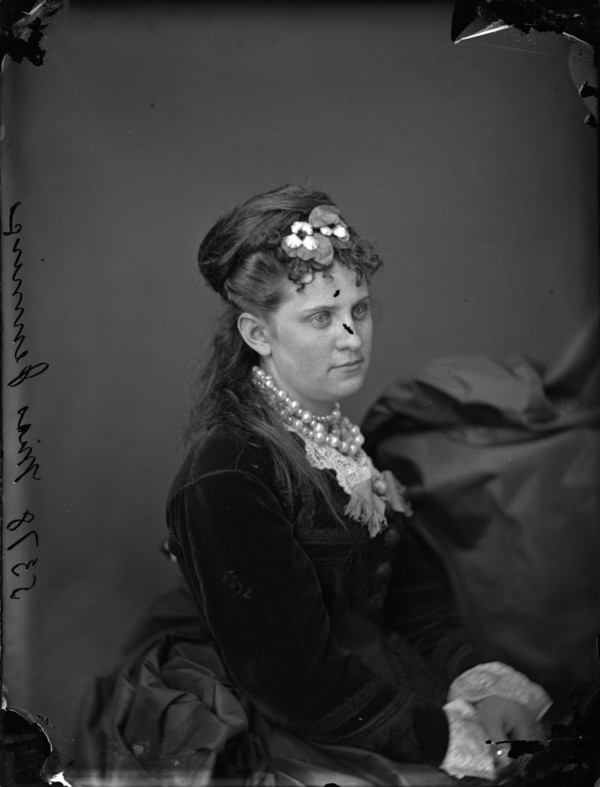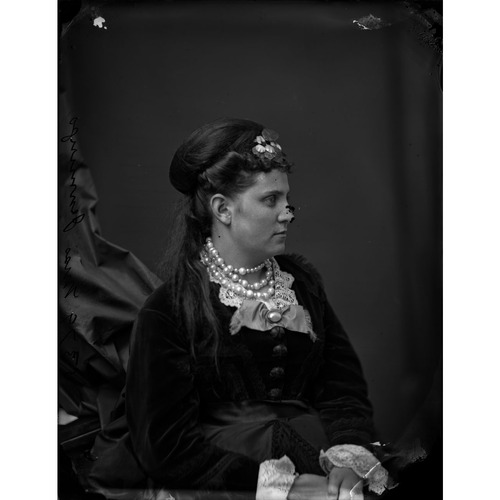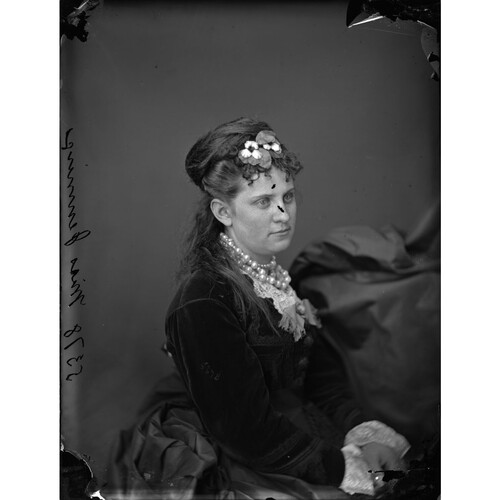JENNINGS, AMELIA CLOTILDA, poet and novelist; b. in Halifax, daughter of Joseph Jennings and Ann Leighton; d. unmarried 1895 in Montreal, probably in September.
The daughter of an English-born dry-goods merchant, alderman, and one-term mayor of Halifax, Amelia Clotilda Jennings grew up in Linden Hall, a house near Fort Needham in Halifax. It inspired the title of her Linden rhymes (Halifax, 1854) and “Letters from ‘Linden Hill,’” published in 1852–53 in the Provincial: or Halifax Monthly Magazine, edited by Mary Jane Katzmann*. Sprightly and gossipy in tone, these fictionalized letters touch on the vagaries of courtship, Halifax social life, and the ironies of fate, revealing an adept turn of phrase and a penchant for light satire: “Some, whom you knew, are dead and some are married, and your friend – Mr. Parktons – beautiful Lily, is neither as yet. . . . It is believed that there are persons in the world – exclusive of the gentleman before mentioned, who would’nt take a whole bunch of lilies in exchange for her.”
Jennings’s poetic series on Nova Scotia wildflowers, also published in the Provincial, is conventional in its sentiment and style, as are the poems of Linden rhymes, dedicated “by permission” to Lady Seymour, wife of the naval commander-in-chief, Sir George Francis Seymour, and published for five shillings per copy. Jennings was actively involved in the publication of the collection, writing to businessman and family friend Robert Dawson of Bridgewater in July 1854 with a “few lines” of prospectus and a wish “to see my book out in two to three weeks.” In the same year she won prizes at the Nova Scotia Industrial Exhibition for her moral tale “The white rose in Acadia” and her poem “Autumn in Nova Scotia,” published together in book form in 1855 under her pseudonym, Maude. No doubt benefiting from the popularity of American poet Henry Wadsworth Longfellow’s Evangeline (Boston, 1847), “The white rose in Acadia” is a tale of “irrational pride” in which an English girl living in the Gaspereau valley of Nova Scotia causes the death of her Acadian lover at the time of the expulsion of the Acadians in 1755. A poem in honour of Scottish poet Robert Burns was purportedly included in a volume issued in 1859, and the lines “From Nova Scotia; by a lady,” which appear in The Burns centenary poems, published that year in Glasgow, may be Jennings’s work.
Contemporary sources credit Clotilda Jennings with publication in the Saturday Reader of Montreal during its two years of publication from 1865 to 1867. The “To correspondents” column contains notes from the editor to “Alma” and “Maude” rejecting submissions to the magazine. The names recall a pseudonym she is known to have used, Maude Alma, and suggest that unidentified pseudonymous poems and sketches from Halifax in this periodical may possibly be hers.
With the death of her father and mother at their home in Poplar Grove, Halifax, in 1868 and 1870 respectively, Clotilda and her sister Harriet inherited property. They may have already left Halifax by 1874 when Clotilda published Isabel Leicester, a romance with the Hamilton Spectator, for there was nothing distinctively Nova Scotian in this tale of a wealthy girl compelled by the death of her father to become an impecunious governess. Continually forced to swallow her bitter pride, Isabel Leicester eventually finds happiness and social position in marriage. The novel does not fulfil the promise of Clotilda’s earlier “Letters from ‘Linden Hill,’” although the relationship of Isabel with her pupils, the revelation of true friendship, and a dramatic rescue from tidal rocks all give the novel a popular readability.
Jennings is reported to have moved to Montreal around 1875, and she appears in the Montreal directory for 1884–85. The title of an 1883 volume of verse, North Mountain, near Grand-Pré, by Mileta, attributed to her, suggests a continuing interest in her native province, and it is as a Nova Scotian writer that the Dominion Illustrated of Montreal introduced her on 15 June 1889, when it published her poem “Sable Island.” She continued to write for the “Red and blue pencil” column of the Dominion Illustrated for some years before her death in 1895 in Montreal. Her sister Harriet died on 6 September, three weeks before an obituary announcing Clotilda’s recent demise appeared in the “Old and new” column of the Montreal Gazette. Jennings’s work is of little significance in the overall development of Canadian literature, but she remains a good illustration of a host of periodical writers who worked well within the sketch form though they never rose above the conventions of popular poetry and fiction.
The book version of The white rose in Acadia, and Autumn in Nova Scotia appeared at Halifax in 1855, under the pseudonym Maude. The poem in honour of Robert Burns presumably written by Jennings was published in The Burns centenary poems; a collection of fifty of the best out of many hundreds written on occasion of the centenary celebration . . . , ed. George Anderson and John Finlay (Glasgow, 1859).
ANQ-M, CE1–48, 6 sept. 1895. DUA, MS 4–77, Jennings to Robert Dawson, July 1854. Halifax County Court of Probate (Halifax), Acts, 3: 344; Wills, 1861–77: 538–44 (mfm. at PANS). PANS, MG 12, misc., 6, no.35: 9–10, 48–49; RG 3, 1, no.86; RG 32, WB, 38, no.599. “To correspondents,” Saturday Reader (Montreal), 19 May 1866: 176; 30 March 1867: 60. Evening Reporter and Daily and Tri-Weekly Times (Halifax), 8, 10 Sept. 1868. Gazette (Montreal), 28 Sept. 1895. Morning Chronicle (Halifax), 7 Sept. 1868. C. C. James, A bibliography of Canadian poetry (English) (Toronto, 1899). Gwendolyn Davies, “A literary study of selected periodicals from Maritime Canada, 1789–1872” (phd thesis, York Univ., Toronto, 1980), 242–47.
Cite This Article
Gwendolyn Davies, “JENNINGS, AMELIA CLOTILDA,” in Dictionary of Canadian Biography, vol. 12, University of Toronto/Université Laval, 2003–, accessed February 25, 2026, https://www.biographi.ca/en/bio/jennings_amelia_clotilda_12E.html.
The citation above shows the format for footnotes and endnotes according to the Chicago manual of style (16th edition). Information to be used in other citation formats:
| Permalink: | https://www.biographi.ca/en/bio/jennings_amelia_clotilda_12E.html |
| Author of Article: | Gwendolyn Davies |
| Title of Article: | JENNINGS, AMELIA CLOTILDA |
| Publication Name: | Dictionary of Canadian Biography, vol. 12 |
| Publisher: | University of Toronto/Université Laval |
| Year of publication: | 1990 |
| Year of revision: | 1990 |
| Access Date: | February 25, 2026 |





